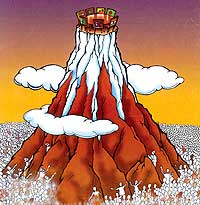 The powwow has begun. Experts are still pontificating, but there is an electric snap in the air. After many years, South Asia is waking up to the potential of SAARC as a forum to strengthen economic ties rather than getting bogged down in regional geopolitics. There is talk of a unified currency and of course, making SAFTA a reality rather than a seminar peg. Will the 'talk more, do less' leaders of South Asia take up the challenge?
The powwow has begun. Experts are still pontificating, but there is an electric snap in the air. After many years, South Asia is waking up to the potential of SAARC as a forum to strengthen economic ties rather than getting bogged down in regional geopolitics. There is talk of a unified currency and of course, making SAFTA a reality rather than a seminar peg. Will the 'talk more, do less' leaders of South Asia take up the challenge? From the last SAARC summit in Kathmandu till date, there have been some significant developments in the region. India's economic outlook and growth have made the world sit up and notice the opportunities for synergy in the region. India's interest in ASEAN, by opening air routes and building transnational highways, points in the future direction of this superpower. There is a thaw on the political front too, however slight, between Delhi and Islamabad. The two antagonists discovered they are losing huge amounts of trade dollars because of the conflict. Should they redress this imbalance, it would add a new dimension to the politico-economic scene in the region.
If India could overcome it's adversity towards China (and the two also share a war) for a piece of the regional trade and economy, surely the same formula can work with Pakistan. India's greater proximity to China provides a new spectrum of opportunities for the region. Yes, there are individuals in South Block who would still want politics to be the main agenda in the region, but propagators of free trade are on the inside track.
Nepal with its own political mess, stands as a bystander to rapid developments in the region. While we could have provided the neutral venue to start regional trade policies and activities, Nepal is now sidelined. Although we have voiced our bit on a unified currency, most of the rhetoric is tied to vague and unfounded fears of neo-imperialism. We, who have a fixed currency regime, find the gumption to disregard a unified currency. The proposed South Asia 'Euro' would not make a big difference: in fact it could bring more fiscal stability to the region.
The Nepali private sector that led the SAARC-isation of trade and industry through the formation of unified body, is now caught in its own politics. The election fever that infects other national trade bodies will get the attention of Nepali business people. The South Asia trade movement is built on strong lobbying by India and Pakistan. Perhaps our fear keeps us from seeing the benefits of seizing more opportunities.
They range from tourism and travel to Business Process Outsourcing (BPO). Nepali tea can freely move to Pakistan through India, and Sri Lankan spices can find its way to the Himalaya without hassles. Manufacturing bases can be located to serve portions of the region and the service industry will not have political boundaries. The WTO will bring in many woes that have not been anticipated. Taking a united stand puts us in a better position to negotiate. So, to all the unbelievers, a regional trade bloc-under SAARC-is the only way forward.



